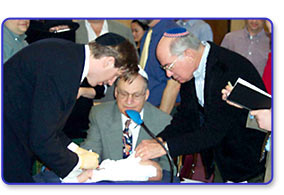



 What's
a bris?
What's
a bris?
Berit mila means the “covenant of circumcision” in Hebrew.
It’s one of the oldest traditions in Judaism, dating back to biblical
times. In Genesis 17:10, Abraham was commanded to circumcise his sons
as a sign of the covenant between the Jewish people and God. This ceremony
has been passed down to us through the ages, and, as such, is one of the
rituals most closely associated with Judaism. Virtually all modern Jews
continue the covenant today. Fortunately for Jewish fathers everywhere,
the commandment was modified many generations ago, to allow the mohel
to step in and perform the circumcision and ceremony instead. Mohelim
are either physicians or observant Jews who have special training in the
technical procedures of newborn circumcision, and the ritual and laws
surrounding berit mila.
The Torah also specifies that the berit be performed on the eighth day, even if that falls on the Sabbath or High Holidays. There are certain exceptions to this, as when the baby is not well enough to undergo the procedure on that day. In these cases, the berit may be done when it is medically safe. As a pediatric urologist, I can often help advise the family in these situations. However, the berit can never be done BEFORE the eighth day. If a circumcision is done before (in the hospital, for example), it is just that-a circumcision.
The berit is usually done in the home or synagogue, and takes less than thirty minutes. I perform a relaxed, family-centered ceremony, and am always willing to include any readings or other elements which will make it a particularly meaningful event. I also always welcome the participation of a rabbi, although as a mohel I am trained to carry out both the religious and medical aspects of the ceremony. My role is to safely perform the surgical procedure, and to create a warm, memorable and personal event for the family and guests.
I do the circumcision itself exactly as I do in the hospital, including the use of a local anesthetic injection to minimize any pain for the baby. All of my instruments are sterilized exactly as they would be for the operating room. I generally use the Mogen clamp, and the procedure itself takes approximately two minutes. During that time the baby is placed on a comfortable, specially-designed bed, and his legs are gently restrained with soft foam straps. I personally feel this is safer than asking the sandek (a position of honor, often the grandfather) to hold the child at what is always a very emotional moment.
After the mila is completed, the baby receives his Hebrew name, surrounded by loved ones. This is often a nice time to explain the baby’s name, and to remember any relatives who could not be present, or are of blessed memory. Following the naming, it is tradition to have a festive meal, to celebrate the joyous occasion.
